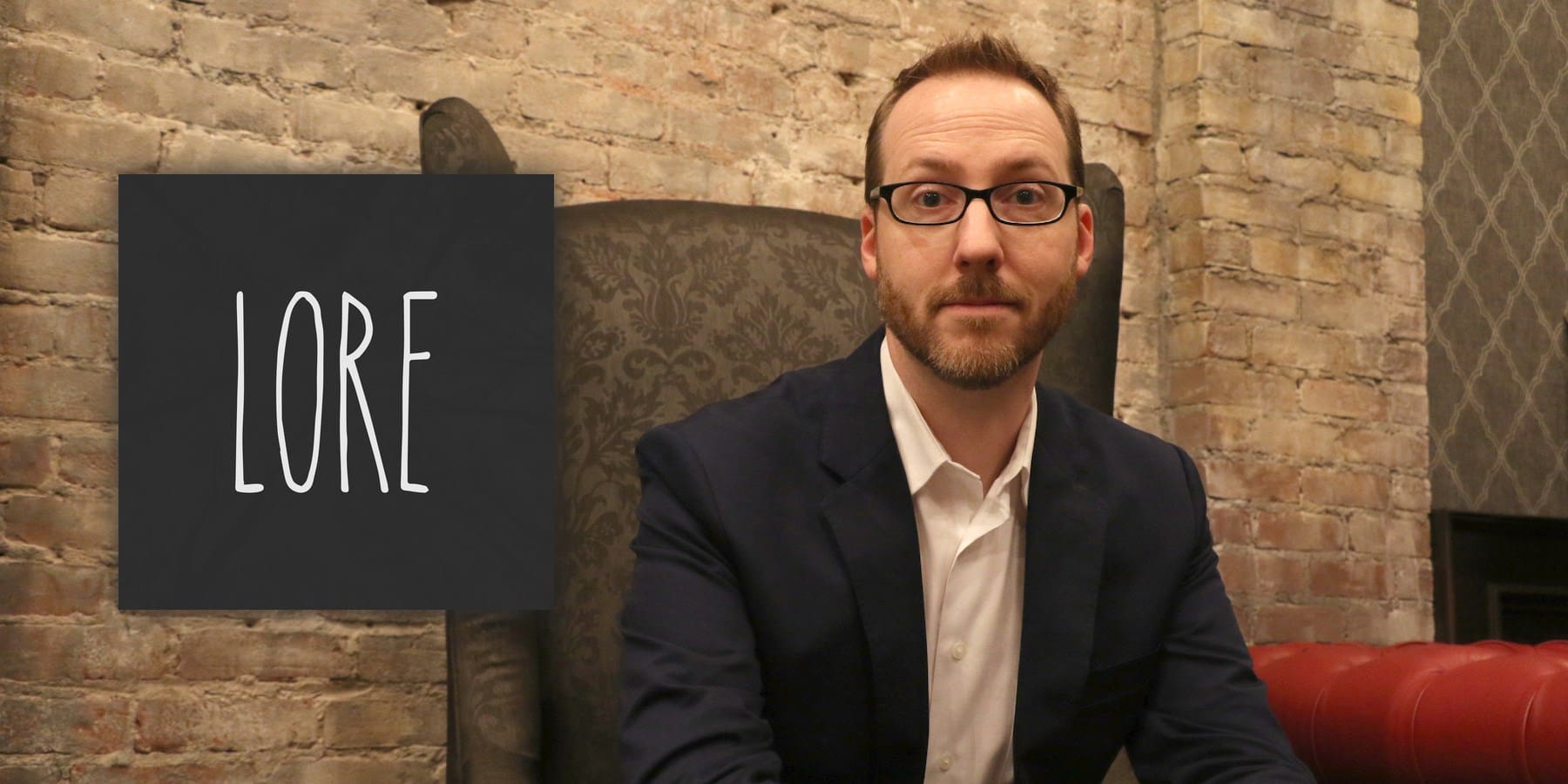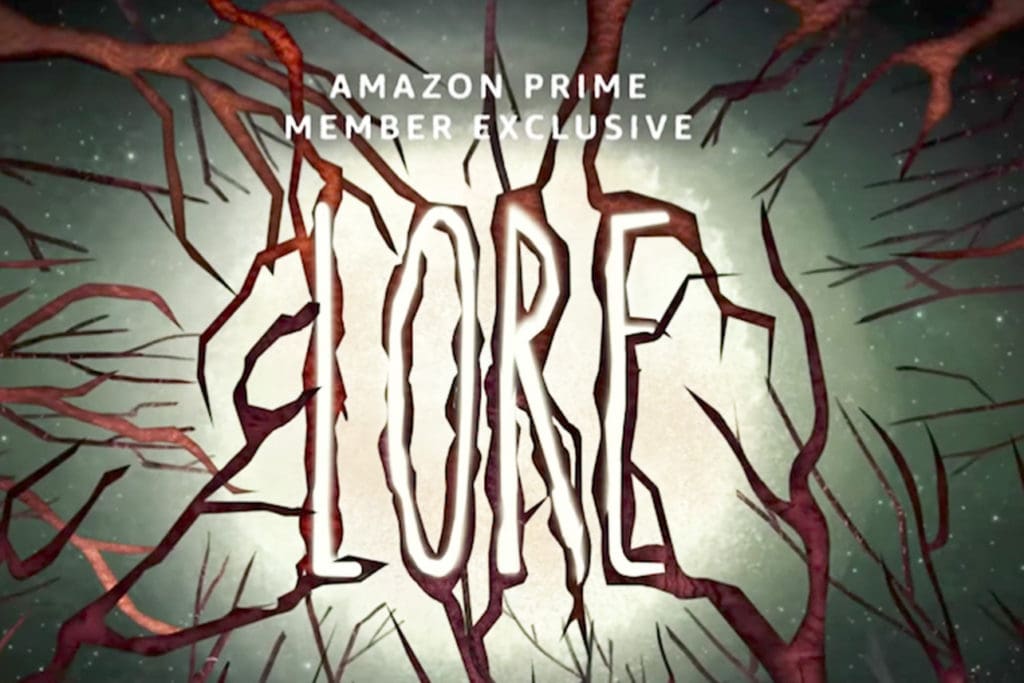As October begins, and the witching hour is upon us, scary stories are at a plenty … but how are any of them true?
Well look no further my fact seekers, as Lore, which premieres on Amazon Prime on Friday October 13, is here to scare you good with history and facts on its side.
The six-part series, which started out and continues as a mega popular podcast created by Aaron Mahnke, is anthology horror at its finest. It chills you to the bone while showing that sometimes fact is scarier than fiction.
Like any good anthology, Lore will feature a plethora of talented actors, with a new, distinct cast headlining each episode. However, one person you’ll see in every episode isn’t exactly an actor — he’s Aaron Manhke, the creator of Lore. The voice behind the podcast serves as the show’s narrator, and you’ll see him in every episode of Lore which was released today.
Pop Break sat down with Manhke to talk about how the podcast started, how it became a television show, and encounters he’s had through the podcast.

How does it feel to see your creation turned into something even bigger and then presented to the entire world?
It’s surreal, guys. Lore was an accident. I was creating a giveaway to promote my self-published novels. The giveaway wasn’t going to work in the PDF format that I wanted it in because who reads 15,000 words on a PDF on their phone? So I almost deleted it, but then I thought, ‘Well I’m an audiobook listener so why not record these, and put the MP3s in a zip file and let people download them?’
That was my vision for them. Then a good friend of mine said, ‘No you should put this in a podcast..and ongoing storytelling experience.’ I fought him a bit on it, but then I jumped in headfirst.
Can you talk about the transition of Lore from a podcast to a television series?
I started Lore in March of 2015, and by August I was starting to get e-mails from production companies. Word of mouth of allowed people to bump into the show. If they’re a producer they might think there was potential for good onscreen storytelling.
So they reached out over e-mail, and I had a lot to sort through. I heard from people who did Yahoo! videos up to the folks I work with. I mean Ben Silverman helped create The Office. Bret-Patrick Jenkins helped create Face Off on Syfy over a decade ago. Then we brought Valhalla — Gail Ann [Hurd] and her team from The Walking Dead — it was a neat journey. But, it was a two year journey. They reached out to me in August of 2015, and after all these meetings, pitching it to networks, and all the production — here we are. TV moves slow. It was something that I definitely learned. [laughs].
Did you have the narrative structure down during the pitches — podcast element first, then the documentary elements, then the acting?
Yes, right from the beginning. The podcast is deceptively simple. It’s just me talking for 25 minutes or so, but it’s different sections. There are moments where it’s historical context, and not the story. For example you might have to understand spiritualism before you understand what was happening in a seance in a particular story. The beauty of television is we can separate these parts more distinctly. For example we could do animation, or found footage. Seeing Robert the Doll onscreen for example adds a whole new element to the story. It was cool to able to use the new tools available and make the pieces even better.
Is there an episode of Lore, that wasn’t produced for this show, that you’d really like to see on a TV screen?
Yeah, but it’d be tough. There’s an episode called “Rope and Railing” about two lighthouse keepers off the coast of Wales. What a great character episode that would be — just two people in a room, and then one of them ends up dead. So it’s one person going insane with a dead person strapped to a railing outside the window, and there’s no help. To me it’s like, ‘How do we build a small wooden lighthouse in the ocean, and film it?’
As a producer on the show how involved have you been in bringing the series to the screen? How do you make sure the show is true to your vision?
I’m part of the whole process. I’m part of e-mail chains. I’m part of the scriptwriting process. I make decisions. At the same time Lore, the podcast, doesn’t stop. The podcast is still going, production is never-ending and I have a team of people on the TV side who are really gifted at what they do. So, it’s been easy to say, ‘I’m going to go continue to make this [podcast] and I trust you to make this [TV show].” Things like the voiceover, where there’s narration by me, I rewrite my lines so they can fit my mouth. Silly things like alliteration — three hard C’s make look great on paper, but it’s really hard to say. I change things like that, or words I’d never use on the podcast.
Out of the all the Lore podcasts which ones that have hit you, or stuck in your mind?
I think the ones that hit me were ones where I couldn’t believe people did that [thing in the episode]. I go at it with such a cold, critical approach because I have a week to make this thing so I don’t have a lot of time to get scared. I’m more appalled by how horrible we are as people sometimes.
What’s the most appalling one?
I just think about “Half Hanged,” which is Episode 12, and it’s the story of Mary Webster. She is accused of being a witch in Boston but is acquitted, then comes back to her home in Western Massachusetts. When the town elder gets sick she gets blamed…because she’s a witch. So they take the law into their own hands, take her outside her own home, and hang her from a tree. When she stops moving they cut her down and walk away. But what I love about it is she gets up the next morning, in the snow. It’s like a huge middle finger to her town. She is actually a direct ancestor of Margaret Atwood who has gone on to write tales that reinforce that middle finger to culture attitude.
How long have you been collecting urban legends? It must be this a life’s work.
It was more of a hobby. I didn’t start really collecting until I started writing the novels. I’ve always been interested in them, but saving them in order to share with others, that was only a few years ago.
What was the selection process for picking the episodes that made the series? Did any get cut? Was it difficult to chose?
I love the choices we made this year. It’s a different format. We’re playing with mixed media — bringing in animation and other things. So I’m glad we have more comfortable horror topics to talk about — vampires, werewolves, and haunted houses. You’re going to be put off enough with this new format, so it’s better to have something familiar [for first time viewers] than have them wrestle with something obscure.
These were easy ones to do, and they were some of my favorites. Mercy Brown’s story from Episode 1 was the impetus of this entire thing, because it really happened. You had Henry David Thoreau talking about it in newspaper clippings. It ended up in Bram Stokers’ personal papers. This was a thing that happened that was super creepy and supernatural, and it really happened.
For your parts of the episode do you have a formula for how long each introduction is going to be?
I stick to a pretty strict limit on the podcast. With TV you have film to contend with.
Did you always intend to be the narrator of the show? Or was there a search for someone to be “you,” but you were the best person to do it?
No, that was never even a discussion. I have a group of listeners. A small audience of how ever many million, and if they’re going to sit down and watch this, they’re going to have expectations. They need to feel comfortable with what they’re watching, especially with all the news stuff we’re doing.
So Chet Lawson’s music is in the background on all these episodes, ad he comes from the podcast. We’re trying to do things like painting the walls the same colors, and putting out your favorite meal –it’s what you’d expect, but just more. And we worked hard at that.
Have you ever had ancestors, or people related to those in the stories reach out to you?
I have, a couple of times. There was a story “Making a Mark” [Episode 28] and it’s set off the coast of Carolina. It’s about a witch who was burned, and there’s a cat.
[Editor’s Note: Here’s the official episode description – Stories leave a mark on us. They can act like scars or decoration, always there, always reminding us of things that happened. But in some cases, those stories leave behind literal, physical marks. Or do they?]
There’s a sea captain who runs a shore, and is staying there in the Carolinas. His last name is Blood, literally he was Captain Blood, and I assumed that was one of those elements that was interjected. The day the episode came out I get an e-mail from someone in Salem, where he was from, saying ‘This [Captain Blood] is one of my ancestors.’ He literally was Captain Blood.
There was an early episode about a man named Bill Russo who was in the woods with his dog, and he sees this created. Bill has actually reached out. That was one of the few episode I’ve done about contemporary people, most of them are about dead people. He found out from a friend who told him it was the best version of Bill’s story he had ever heard. Bill listened to the episode and now the next time I’m down at the Cape I’m going to get drinks with him.



Comments are closed.